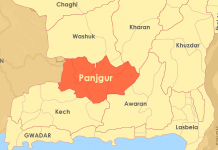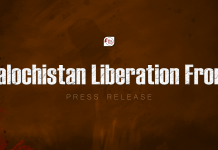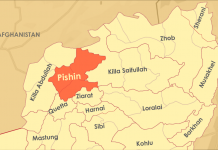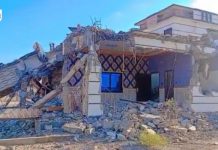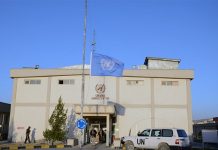Author: Shahzain Baloch
In societies under colonialism, death is not natural but inflicted by the master who controls the society. In the vast, rugged expanse of Balochistan, every journey on its highways is fraught with danger. Behind the facade of routine traffic accidents lies a more sinister reality: a landscape where tragedy seems orchestrated, where each collision, each fatality, whispers of a deeper, more calculated design.
Balochistan, a region marred by decades of conflict and strife, finds itself grappling not only with the perils of rugged terrain but also with the specter of state policies that some allege are driving its people toward oblivion.
Balochistan has been under Pakistani occupation for more than 70 years. The plight of Baloch people in Balochistan is a tragic saga of systemic oppression, political subjugation, and relentless violence perpetrated by State authorities. The orchestrated campaign of violence against Baloch activists and civilians, characterized by extrajudicial killings, enforced disappearances, and arbitrary detentions, represents a gross violation of human rights. Pakistani security forces, acting with impunity, have employed brutal tactics to silence dissent and maintain their grip on power, leaving a trail of devastation and despair in their wake.
The haunting specter of Pakistan’s nuclear bombing of Chagai looms large over the landscape of Balochistan, casting a long shadow of suffering and deprivation upon the people of Chagai. Baloch people, who have met relentless State repression, now grapple with the added burden of environmental degradation and health crises. To add to the distress, uranium extraction in Dera Ghazi Khan has unleashed a cascade of concerns regarding its impact on the local population. The presence of uranium poses a grave risk to public health, as exposure to radioactive material can lead to various ailments, including cancer and birth defects.
According to a report by The Balochistan Post published on April 18, 2024, staggering statistics from the third quarter of 2024 paint a grim picture of the ongoing tragedy unfolding on the roads of Balochistan. With 538 families affected by road accidents, the sheer scale of human suffering is undeniable. However, what is perhaps even more alarming is the vast discrepancy between reported and unreported incidents, revealing a systemic failure in addressing the root causes of these tragedies. Among the reported accidents, involving 12 pedestrians, 36 motorbikes, 93 cars, 13 pickup trucks, 10 minibuses, 26 buses, 15 trucks, and 7 trailers, the toll on human lives and livelihoods is devastating. With over 121 fatalities and 417 injuries, the human cost of these accidents cannot be overstated. Moreover, the distribution of these accidents across different regions in Balochistan, from Mastung to Bolan, Turbat to Gwadar, underscores not only the failure of governance but also serves as irrefutable evidence of Pakistan’s genocidal agenda towards Baloch, systematically marginalizing and oppressing Baloch for decades.
Dr. Mahrang Baloch criticized the government’s prioritization of federal projects like motorways and the Orange Line over essential infrastructure development in Balochistan on social media on March 10. The lack of adequate roads has led to the tragic loss of talented young Baloch lives.
Road accidents in Balochistan serve as a grim reminder of Pakistan’s deliberate neglect and oppression of the Baloch people. These incidents are part of a larger pattern of systemic marginalization. Pakistan’s deprivation of Balochistan of vital infrastructure and roads effectively enacts a genocidal policy against the Baloch masses. These incidents cannot be dismissed as mere fate or coincidence. They are the direct result of a deliberate policy of negligence and marginalization pursued by Pakistan as part of its broader strategy to suppress the Baloch people.
This negligence can be viewed as a form of genocide. It can also encompass acts of systemic violence and oppression that result in the destruction of people’s way of life. In the case of Balochistan, the Pakistani state’s policies of negligence and marginalization amount to a form of cultural and socio-economic genocide, aimed at erasing the identity and autonomy of the Baloch Nation.
Disclaimer: The views and opinions expressed in this article are those of the author and do not necessarily reflect the official policy or position of The Balochistan Post or any of its editors.











